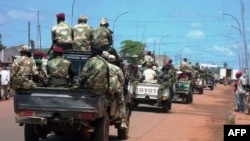Officials in the Central African Republic say recent fighting in the northwest has killed at least 60 people and displaced tens of thousands more, as the security situation in that country continues to deteriorate. The latest clashes were between soldiers from the ruling rebel coalition and rival militias.
A government spokesman in the Central Africa Republic said the casualties occurred during fighting that began Sunday around the town of of Bossangoa, north of the capital, Bangui.
The United Nations Office for Humanitarian Affairs (OCHA) said about 30,000 people, or 80 percent of the town’s population, have fled into the wilderness or to other areas.
Amy Martin, head of the U.N. humanitarian office in CAR, said the fighting, between soldiers from the ruling Seleka coalition and community-based militias, is part of an unsettling trend in the country wracked by insecurity for decades.
“I think it’s an old pattern which is re-emerging again, which catches the civilian population in between two different factions, of the Seleka which are in power today and the rebel movements which are against them,” said Martin.
The government blamed the fighting on militia loyal to former president Francois Bozize, who comes from Bossangoa, and who was ousted by the current rebel leaders.
Martin said Seleka has been aggressive in trying to identify these rival groups, and has intimidated the population and burned down villages in the process.
U.N. OCHA also reported two workers from the French aid organization acted were killed by Seleka forces in the same area over the weekend.
Martin said her office is urging authorities to do more to protect humanitarian workers on the ground.
“We’ve seen an unfortunate situation where we have lost two NGO workers in Bossangoa, we call on the authorities to ensure the safety and security of all civilians as well as the aid workers who are trying to support the communities in Central Africa," said Martin.
U.N. OCHA said fighting in the northwest between the local population and Seleka caused more than 148 deaths in August.
Seleka’s leaders have promised to rein in their soldiers following past reports of looting and other violence in and around the capital.
The coalition is trying to push through a political transition process that could see elections in the country in the next 18 months.
A government spokesman in the Central Africa Republic said the casualties occurred during fighting that began Sunday around the town of of Bossangoa, north of the capital, Bangui.
The United Nations Office for Humanitarian Affairs (OCHA) said about 30,000 people, or 80 percent of the town’s population, have fled into the wilderness or to other areas.
Amy Martin, head of the U.N. humanitarian office in CAR, said the fighting, between soldiers from the ruling Seleka coalition and community-based militias, is part of an unsettling trend in the country wracked by insecurity for decades.
“I think it’s an old pattern which is re-emerging again, which catches the civilian population in between two different factions, of the Seleka which are in power today and the rebel movements which are against them,” said Martin.
The government blamed the fighting on militia loyal to former president Francois Bozize, who comes from Bossangoa, and who was ousted by the current rebel leaders.
Martin said Seleka has been aggressive in trying to identify these rival groups, and has intimidated the population and burned down villages in the process.
U.N. OCHA also reported two workers from the French aid organization acted were killed by Seleka forces in the same area over the weekend.
Martin said her office is urging authorities to do more to protect humanitarian workers on the ground.
“We’ve seen an unfortunate situation where we have lost two NGO workers in Bossangoa, we call on the authorities to ensure the safety and security of all civilians as well as the aid workers who are trying to support the communities in Central Africa," said Martin.
U.N. OCHA said fighting in the northwest between the local population and Seleka caused more than 148 deaths in August.
Seleka’s leaders have promised to rein in their soldiers following past reports of looting and other violence in and around the capital.
The coalition is trying to push through a political transition process that could see elections in the country in the next 18 months.




